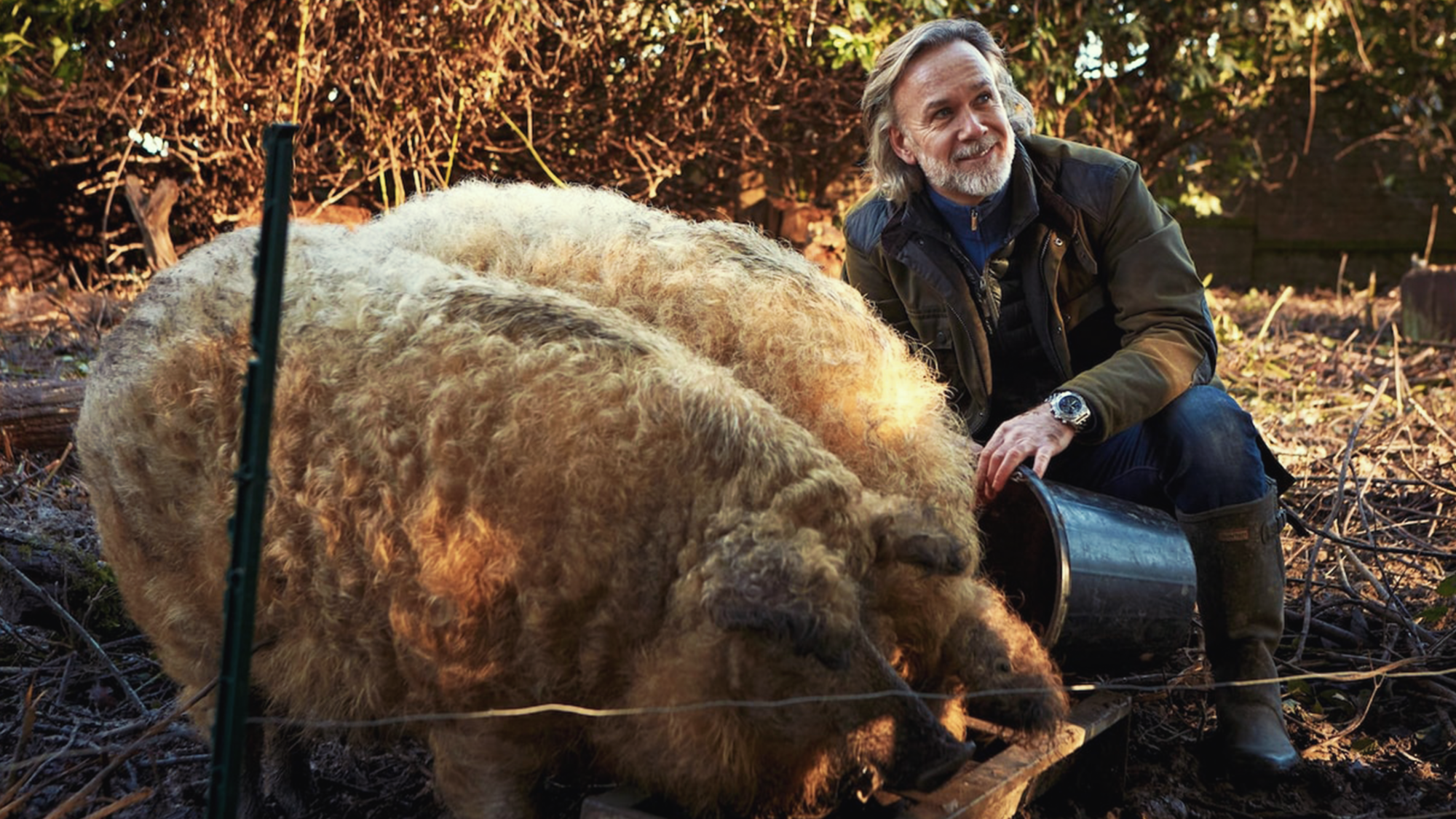Conjure Marcus Wareing in your mind’s eye. What do you see? Wareing, bolt upright, next to a stainless-steel kitchen counter glaring at you with his arms folded. He is wearing starched chef’s whites as smooth and pristine as a good béchamel. His cornflower eyes hack into you like ice picks.
Yeah, me too. So imagine my unease at sitting opposite the MasterChef: The Professionalsjudge and Michelin-starred chef at the kitchen table of his beautiful country home in East Sussex, where he is not only sitting down, but dressed down, calmed down and cheered up.
‘I’m a totally different person here,’ Wareing says, gazing through the French doors towards his duck pond. Jane, his wife of almost 22 years, refills his coffee. He’s in green Birkenstocks, a denim shirt, gilet and jeans. The hair and beard are as magnificent as ever. Urban-country, cuddly but chic, like Father Christmas put through the Queer Eye process. We steep in the silence for a moment. At 51, has Marcus Wareing… mellowed?
It’s mid-January on a bright, crisp morning, and Wareing’s 65-acre smallholding looks resplendent. Morning frost glistens on his vast kitchen garden, where later this year he might have everything from pumpkins to cucumbers, raspberries to wild garlic. Whatever he wants, really. He and Jane bought the place five years ago, after their children – Jake, now 20 and studying business at university, Archie, 17, and Jessie, 14 – moved to boarding schools in the area.
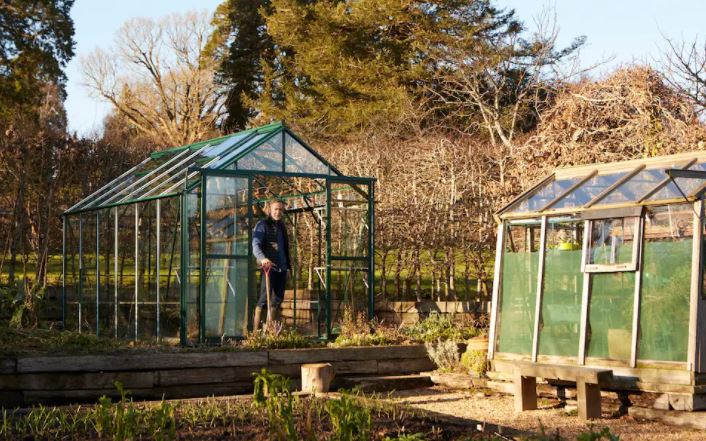
They spend most weekends here, including the one in October 2019 when their main home, in Wimbledon, was robbed by Chilean ‘burglary tourists’, who took £33,000 of jewellery and watches from the couple.
‘If we didn’t have kids we probably wouldn’t be sitting here right now,’ Wareing says. Travelling from London to football matches and parents’ evenings in Sussex and Kent reminded him the countryside exists, is nearby, and is actually quite nice. ‘You forget – 30-odd years in a kitchen, and you don’t look up.’
When he was a young chef, ingredients would turn up at the back door, but he had ‘absolutely no interest’ in where they had come from. Now, at a time when eating locally is not just in vogue but environmentally essential, he has decided to try to understand food ‘from soil up, rather than plate down’.
Something changed in lockdown. Perhaps it was a male, middle-aged TV competitiveness after seeing Jeremy Clarkson’s success with his land, but he’s recently started taking it seriously, wellies on, starting with his kitchen garden.
‘When I looked around this place, the first thing that came to mind was, “Kitchen garden… f—ing hell, I’m a chef!” It’s that eureka moment. I’m the son of a fruit and potato merchant, of course I can grow things.’
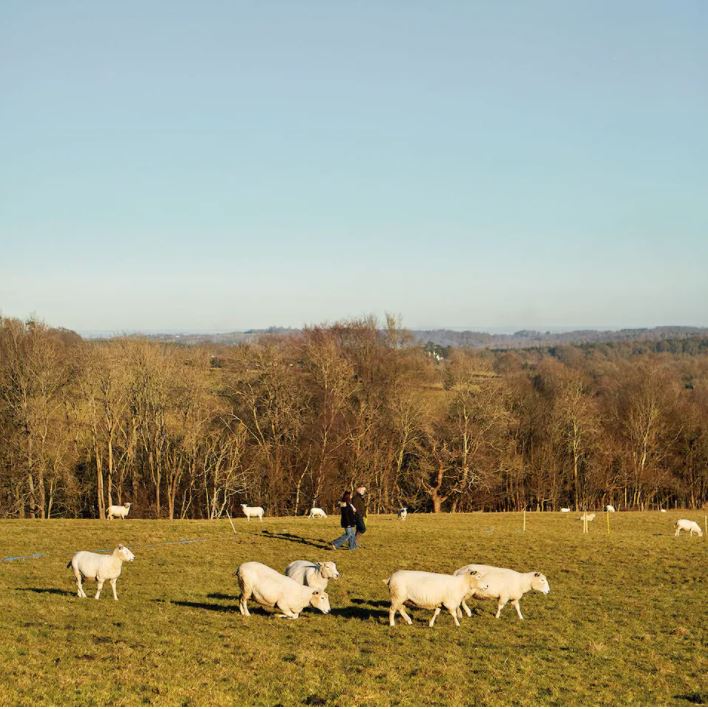
The results can be seen in his new TV series, Marcus Wareing’s Tales From a Kitchen Garden. It is part Clarkson’s Farm (there’s an extended scene in which Wareing tries out mowing a field with a tractor, to find out how hard it is), part Gardeners’ World (lots of kneeling in flower beds), part Countryfile (a rolling cast of producers from all over the country, from apple experts to edible flower foragers) and each episode ends with an outdoor cooking segment, filmed in a makeshift kitchen on the terrace. It takes viewers through a full growing summer. I’ve seen two – one on chickens, one on pigs – and they’re great.
On the surface he is an unlikely figure for such a show. Not only is he usually polished, clean and authoritative, but I’m not actually sure I’ve ever seen footage of him outside before. The new series is a significant step for a man whose 35-year career took off when he was protégé and sidekick to Gordon Ramsay in the ’90s, almost crashed when they had an almighty falling out a decade later, had a satisfying second act with Wareing’s own restaurant success, and then gained him celebrity through his work as head judge on Master-Chef: The Professionals. Oh, and then there are his nine cookbooks – the most recent of which, in lockdown, he co-wrote with Jane. Perhaps ‘homely household name’ is the next entry to the CV.
Wareing is at pains to say he is ‘on a much, much smaller scale’ than Clarkson, and the pressure is off, ‘given I don’t run this as a business’. The excess fruit and veg grown here is either given out to locals or sent to London to be used at Marcus, the Michelin-starred fine-dining restaurant Wareing runs at the Berkeley Hotel.
Most of the farmland is let out to a neighbouring farmer, Stuart, who grazes sheep and cattle, but Wareing does have five chickens, three sheep, two ducks, two cows and two pigs.
Another local, Anatoly, looks after the garden side of things. Both Anatoly and Stuart taught him the basics of their trades – be it what to plant in the kitchen garden and when, or the yearly cycle of maintaining a field for livestock – and now Wareing can disappear for hours, planting veg or fixing fences or feeding pigs. He runs and boxes daily, but he works up more of a sweat gardening for a day than in either sport.
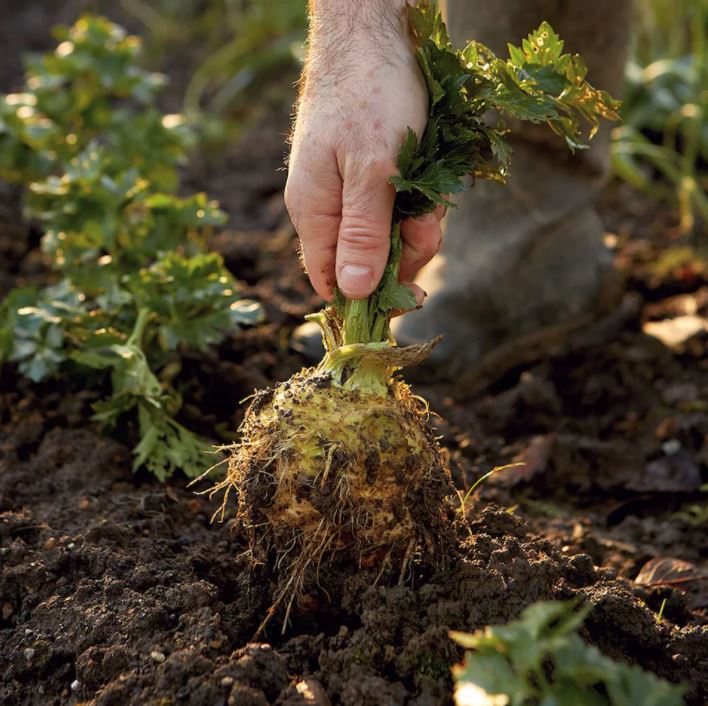
‘It looks simple, but that’s one tough life,’ he says. ‘I’m happy to make mistakes, you’re dealing with Mother Nature. When I work with Anatoly, I feel like I’m working with my dad again. But he works for me, and he’s younger than me.’
The house is basically spotless, but after reading interviews in which Wareing seemed an inveterate clean freak (‘Years ago, when he was home late every night, I’d have to make sure his route through the house was clear of clutter,’ Jane has said, ‘I’ve lost count of the number of times he’s thrown shoes into the street’), I’m surprised he’s ignoring the tea towel on the floor, or that mug off a coaster…
‘The way I live and work in London is completely different, I really do relax here,’ he says.
Jane, who is a year younger and in a stylish navy jumper and jeans, seems as naturally easy-going as her husband isn’t. I turn to her. Has he relaxed? ‘Well, that’s age as well,’ she says, ‘and he is a clean freak and all straight lines, but [here] he’s had the realisation that things don’t always grow in the way you want them to.’
Nearly 30 years ago, when they met at the nearby Gravetye Manor hotel, where Wareing was a sous chef and Jane worked on reception, a country house with five chickens, three sheep, two ducks, et al wasn’t in their plans for the future.
‘None of this was – not a restaurant, not a big house, not even a house, there was never a plan. We were just at work…’ Wareing says, and suggests it’s time for the tour.
He kicks the Birkenstocks away. ‘Let’s go.’
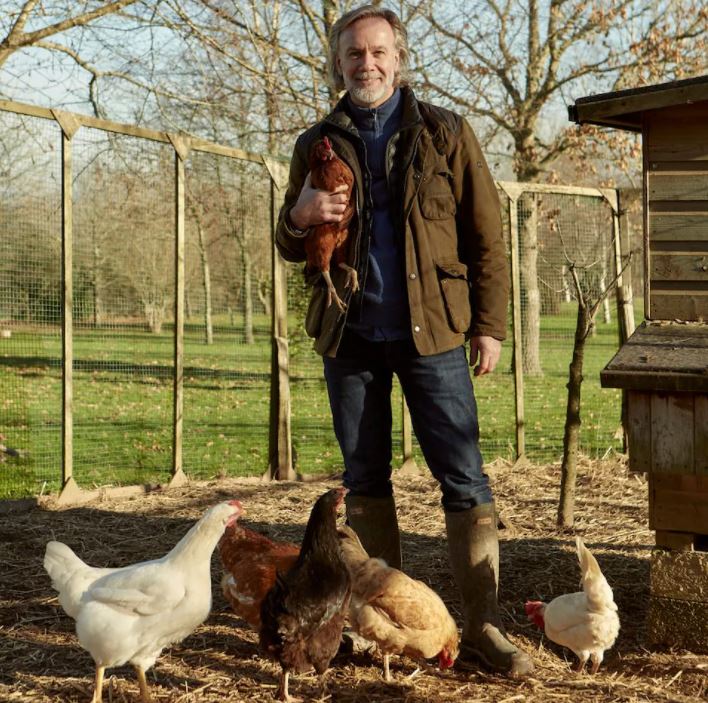
Wareing wouldn’t describe himself as a country boy, but he’s always been fairly proximate. He and his elder brother, Brian, grew up in the Merseyside town of Southport. Their father, Raymond, was ‘a total workaholic’; their mother, Eileen, a housewife.
The boys would help out with their father’s wholesale grocery business, and Wareing left school at 16 to work in the firm full-time. But when Raymond warned him there didn’t seem a future in it, he looked to what his brother was doing – Brian too is a chef – and decided to follow him.
Wareing was naturally talented and could work harder than anyone, so at 17, when he got a job at The Savoy in London, that’s how he made his name: standing at the pass for 16 or 17 hours a day, seven days a week. ‘That’s what my dad taught me,’ he says. ‘When he put me on that train at Liverpool Lime Street to come to London, he just said, “Work hard and stand out.”’
Wareing is a nice man: chippy but respectful, and aware he needs to laugh at himself – I expect Jane helps there. Though his vocal delivery can sometimes call to mind a robotic football pundit reflecting on a scrappy match away at Wigan, he’s honest and direct, and has a curious, David Brent-like habit of asking himself multiple questions (‘Did I want to do it? No, not really. Did I need to do it? Yes.’), which makes interviewing him a competition with his inner voice.
We come to the kitchen garden where come summer there will be beetroot, chicory, celery, butternut squash, kale, herbs, a lavender garden for the bees. On the lawn next to it, two ducks toddle along.
‘I just love them,’ Wareing says, ‘I think they’re great characters.’ Not for Sunday lunch, then? ‘No, they’re part of the family now.’
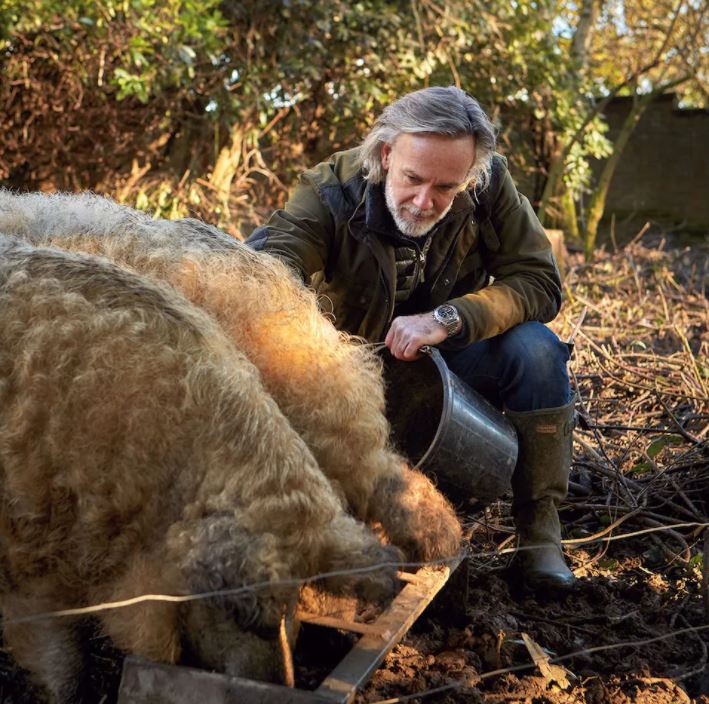
His career took flight in 1993, when the 26-year-old Gordon Ramsay, himself the protégé of Marco Pierre White, hired him as his sous chef at Aubergine in Chelsea. It was the hottest restaurant in London, gained two Michelin stars and featured a kitchen of 20-somethings who would become giants of the city’s restaurant scene – not just Ramsay and Wareing, but also Angela Hartnett and Mark Sargeant.
Thanks to 15 years of bleep-heavy TV shows, we all know what Ramsay is like to work under. Wareing is prone to a temper himself, but these days ‘kitchens are quieter’. Cooking, he says, used to be all flames and banging pots, but now you can cook a fillet of beef in a water bath. The science of cooking has taken the temperature down. ‘I think we owe that to Heston.’
Plus, the new generation consider their mental health, and call out bullying. So the way Ramsay spoke to Wareing wouldn’t be tolerated?
‘Well, it was a different time,’ he says.
No idiot sandwiches, then? Wareing laughs. He has heard tell of Ramsay’s viral moment – in which he slams a piece of bread either side of a woman’s head, tells her she’s an ‘idiot sandwich’ and makes her repeat it – but hasn’t seen it himself.
We reach the duck pond, 11 bee hives, a new orchard with crabapples and russets… a paddock that looks like the day after the Somme. The destruction is the work of Wareing’s two 18-month-old Hungarian Mangalica pigs. ‘They’re the Wagyu of pigs,’ he says, proudly. Not that he can kill them – he and Jane are too fond. So like all his animals, they are pets, or at least rotavators who run on excess food waste.
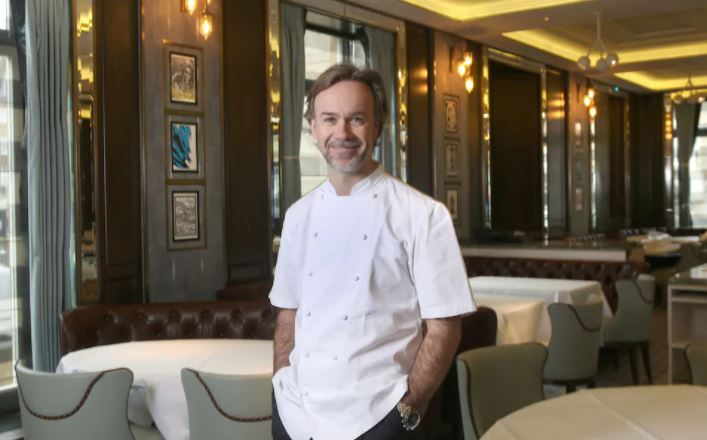
The Ramsay relationship ended badly. Ramsay was Wareing’s best man, and godfather to Jake, but when Wareing decided to cut loose in 2008 and set up on his own – turning Pétrus, the restaurant he opened with Ramsay, into Marcus Wareing at The Berkeley – things went sour. Lawyers got involved; the relationship was severed completely.
Shortly after, Wareing told Waitrose Food Illustrated that under Ramsay he had felt ‘constrained, confined and trapped’, and gave Ramsay some advice: ‘Put a gun to my head, shoot me, put me in a box and bury me because if you don’t, I’ll come back and come back. I’ll never give up until I get where I want to go.’
Suffice to say, Wareing got to where he wanted, and now – though they still don’t speak – he has only good things to say about Ramsay. He credits his ex-mate with raising standards everywhere, and breezily mentions him alongside others – Heston Blumenthal, Jamie Oliver, the Roux brothers – he feels have revolutionised the food scene in this country.
Wareing used to be involved in a number of restaurants but now focuses on just Marcus at The Berkeley. And while he’s mainly about eating locally these days, he’s not about to start influencing policy, à la Jamie. But if he did, it’d be no nonsense.
‘We’re adults, we can make our own choices. There needs to be more information, [but] can’t an adult read a packet? What do you want, the nanny state to tell us what to do? If you want to eat a load of fast food, then yeah, you’re going to have a lot of problems down the line,’ he says.
‘If you can’t get out and go to work… It’s funny, people think there’s no jobs out there. There’s more jobs in my industry than you can shake a stick at. It’s a case of wanting to do a job, that’s all it is.’
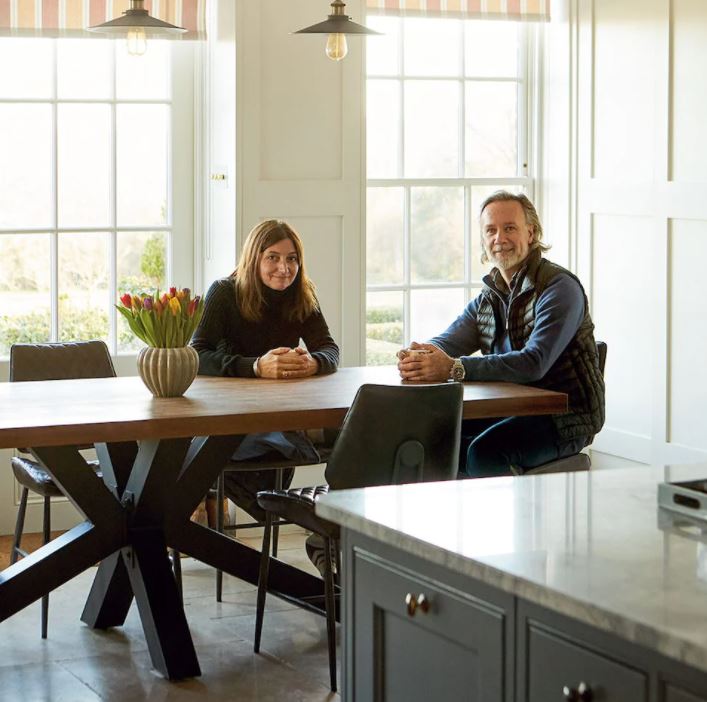
We’re back in the family kitchen, and I wonder if Wareing regrets missing so many dinners with his kids when they were growing up. ‘Are you serious? No. I had a job to do, I was on a train track going at 100mph.’
He didn’t feel bad for Jane?
‘No, what would I feel bad for her for? She married a f—king chef.’ He’s somewhere between exasperated, angry and laughing. ‘What is she going to expect? You think I’m going to become some soft-ass, coming home at six o’clock at night because I’ve got married? She married a guy that was working 16 hours a day.’
But what if she wanted to work 16 hours a day…? ‘That wasn’t even an option, because from the day I met Jane, nothing has ever changed. I can’t have a baby, can I? So when Jane was pregnant, she had to stop, because that’s what Mother Nature tells you to do. I didn’t give birth.’
He laughs again, until I say she sounds a little long-suffering. ‘That’s not true. That’s not true at all.’
We move on, but when Jane walks back through, Wareing interrupts to insist I ask her how she coped. She looks pleased to clear it up. ‘It comes across as I’m a bit of a doormat. But when we met, he was a chef, and I knew that life, and you just like someone and you get on with it,’ she says. ‘I stayed at home, looked after the kids. Sometimes it was annoying – “your dad’s asleep on the sofa, again” – but that was the way it was.’
Wareing smiles at me and spreads his arms. ‘Thank you.’
They are a perfectly matched pair. Jane is in charge of most of the meals at home and understands that a critique is inevitable. Their lockdown cookbook, Marcus’ Kitchen, was inspired by conversations about how basic weekday suppers can go wrong. As a family, they occasionally score her dishes out of 10.
Last night she did a shepherd’s pie, which Wareing and the kids declared ‘wet’. ‘She left the potatoes sitting in the water to keep them warm, and it doesn’t matter how long you drain them, you’ll never get rid of it,’ he says. Then, turning to Jane: ‘And that’s the reason why your potato purée wasn’t as good as it normally is. But next time, just try harder.’
She flicks him the Vs. ‘Well you were watching football, so get off your arse if you have a problem…’ They both laugh.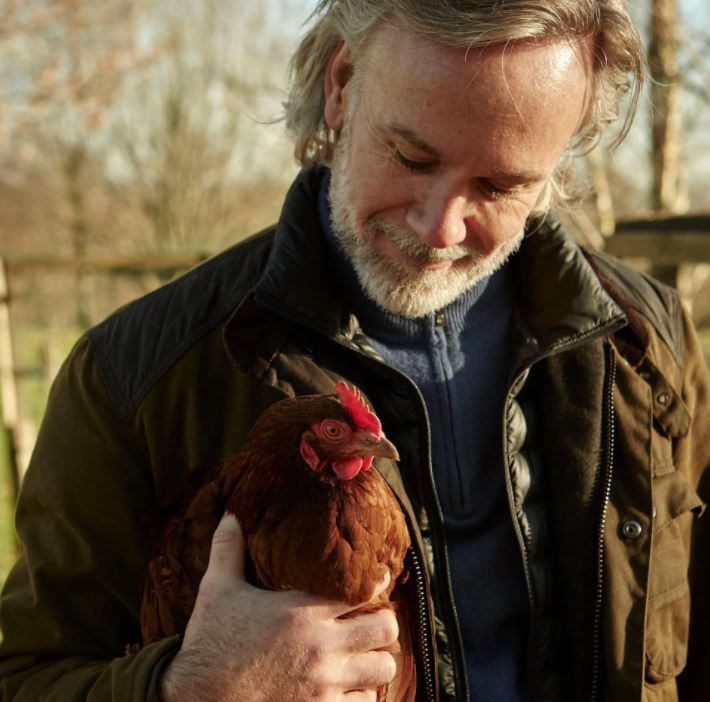
Fortunately, the children have inherited Wareing’s work ethic. Jane says Archie recently told her that a big motivating factor for him is not disappointing his father. Wareing nods. ‘I expect them to work hard. One thing I don’t want is for them to regret not working harder.’
They’re all into food but Jessie is ‘becoming the best’ – at online recipes, that is. ‘My daughter will follow something off the internet before she picks up one of my cookbooks,’ Wareing huffs. ‘She’ll be like this on her phone in the kitchen.’ He mimes scrolling and stirring at the same time.
Marcus, I say, this is why you need to join TikTok. Jane hoots. ‘F–k off,’ Wareing spits. ‘TikTok my arse. Just the name annoys me…’ And this is him relaxed.
‘People keep asking me, have I mellowed? But put a chef’s jacket on me, put me in a kitchen, and I’m totally different,’ he says.
I believe him. But all of this – the fresh air, the clods of soil, the feathered friends – is making him a better chef and, whisper it, probably a better man.
‘All I’m doing is reading around my subject. Meeting people, farmers, producers. I realised there was something for me to learn. Producers are the king. We’re just a link in the chain.’
Marcus Wareing’s Tales From a Kitchen Garden airs Monday-Friday for two weeks from 28 February at 6.30pm on BBC Two

